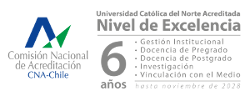El Ego Cogito, the starting point for the world’s reconstruction or transcendental subjectivity.
DOI:
https://doi.org/10.22199/S07198175.2014.0001.00005Keywords:
Ego Cogito, Transcendental Phenomenology, The World of LifeAbstract
This paper studies Descartes’s ego cogito and the consequences that the French philosopher could draw from his own finding. We will compare them with Edmund Husserl’s cogito and his transcendental phenomenology. In addition, we will try to explain some of the reasons why Descartes could not see the whole scope of his finding.
References
DESCARTES, RENÉ. (1937) Discurso del método. Meditaciones metafísicas. Madrid: Espasa Calpe.
HUSSERL, EDMUND. (2008) La crisis de las ciencias europeas y la fenomenología trascendental. Buenos Aires: Prometeo Libros.
LAS CONFERENCIAS DE LONDRES. (2012) Método y filosofía metodológicos. Salamanca, Ediciones Sígueme, Salamanca.
SAN AGUSTÍN. Contra los académicos. Obras de San Agustín, Vol. III. Madrid: Biblioteca de Autores Cristianos, 1971.
HUSSERL, EDMUND. (1985) Ideas relativas a una fenomenología pura y una filosofía fenomenológica. México: FCE, 1985. Disponible en: http://www.opuslibros.org/Index_libros/Recensiones_1/husserl_ide.htm
GUTIÉRREZ POZO, ANTONIO. La realización del programa fenomenológico de Husserl. Disponible en: http://www.aafi.filosofia.net/ALFA/alfa7/ALFA7C.HTM
SCHMITT, RICHARD. La reducción fenomenológico-trascendental de Husserl. Disponible en: http://www.oocities.org/espanol/gruposer_cl/reduccion.htm
Published
How to Cite
Issue
Section
Los autores continúan como propietarios de sus trabajos, y pueden volver a publicar sus artículos en otro medio sin tener que solicitar autorización, siempre y cuando indiquen que el trabajo fue publicado originariamente en Revista Cuadernos de Teología (eISSN:0719-8175).












_(1).png)






